Gujarat: How GPCB’s Public Hearing on Vedanta’s Zinc Plant in Tapi Turned ‘Violent’
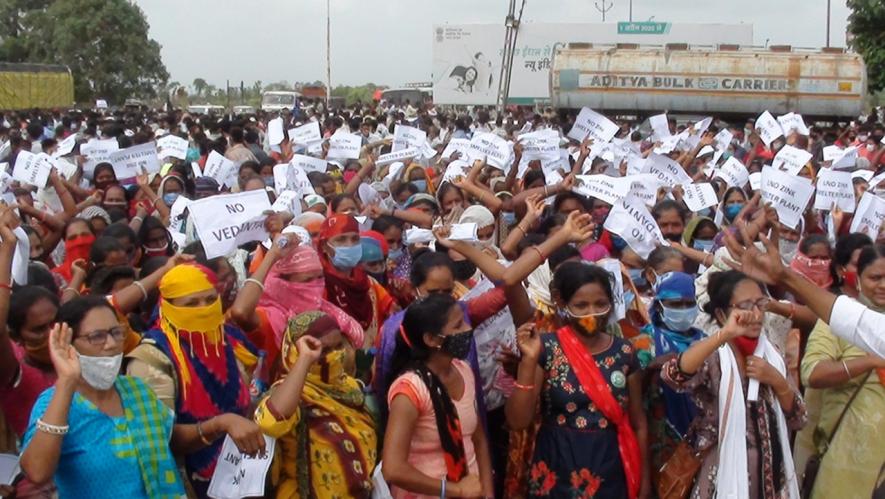
On July 5, a public hearing for the Hindustan Zinc Limited, a smelter plant by Vedanta group in Tapi district of Gujarat, ended in violence, with police firing over 50 tear gas shells and lathi-charging agitated villagers to “disperse” them, some of whom allegedly resorted to stone-pelting.
The public hearing had been called by the Gujarat Pollution Control Board (GPCB), and as per reports, tribal villagers had sought its postponement due to the pandemic.
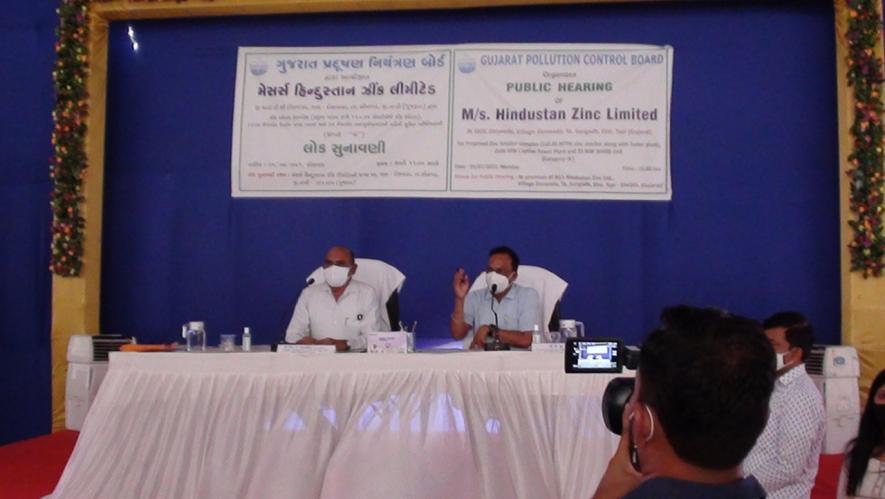
So, what went wrong on July 5?
Krishnakant Chauhan, a Gujarat-based environment activist told NewsClick that “the atmosphere had been tense and intimidating since morning, as there was heavy police deployment for the public hearing. The make-shift tent built for purpose was divided into compartments, fitted with screen for a group to watch the proceedings.”
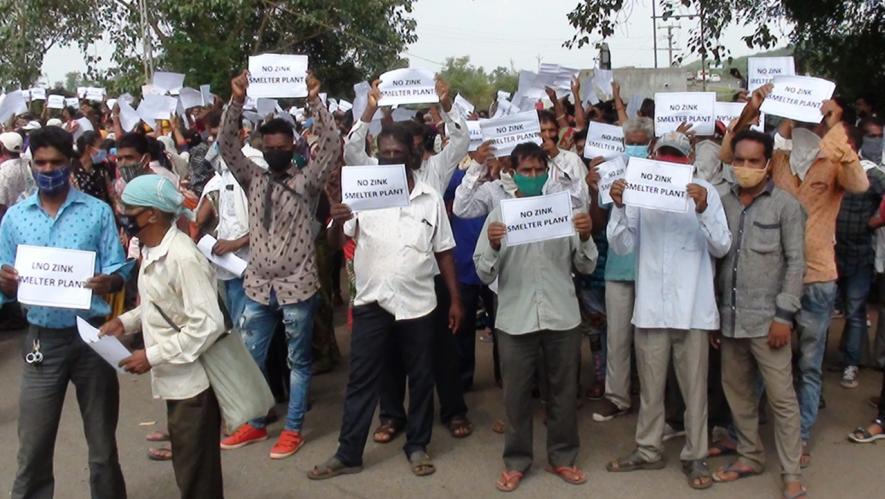
Explaining how the situation escalated, with several villagers feeling they were not heard out, Chauhan said: “Each compartment was completely isolated from the other. The Collector and the authorities were sitting in one compartment. This made sure that villagers would listen, but not get to ask questions. After a certain number of villagers were allowed to enter, the entry was closed. The villagers who couldn’t enter began gathering around the tent and blocked the highway.”
After a while into the public hearing, the GPCB authorities announced that they had taken all depositions into record. “They said they have received six written depositions and concluded the process of the public hearing. This created a lot of commotion among villagers who raised objections. AG Patel from GPCB, who was secretary to the Collector for the public hearing, said the proceedings stands postponed.”
Chauhan said, meanwhile, tribal community members from villages around the smelter project kept gathering outside the tent and the crowd swelled from around 800-900 to about 5,000.
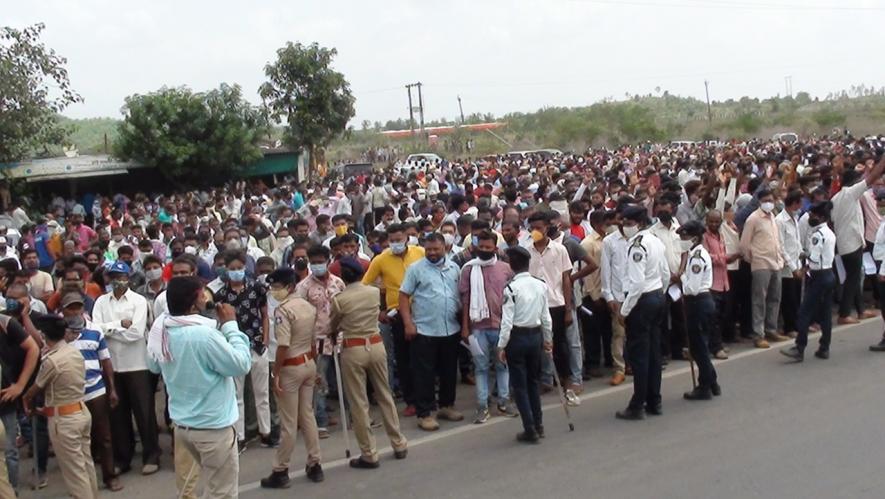
“They said they did not trust the authorities and the proceedings, where they weren’t included. As the local leaders came out and tried to talk to them for vacating the roads, the police began a lathi-charge to disperse the crowd. That is when the crowd turned violent, there was stone-pelting and police began firing tear gas shells,” he added.
The environment activist said village heads had warned of such a turn of events, as fear had been building up on the impact of the zinc smelter plant on the area’s ecology and livelihoods.
“The local tribal leaders and sarpanchs from at least 35 villages had warned of a situation like this. Two days before the public hearing, sarpanchs from Dosvada and other villagers had attempted to meet the Collector to inform him that people would turn up in huge numbers as they are apprehensive of a smelter plant being built in the area. They had also requested postponement of the public hearing in view of the pandemic. An urgent email was also sent in this regard to the Collector. The sarpanchs who were present at the hearing had once again requested postponement as people were feeling intimidated and had no clarity about the project,” said Chauhan, who had attended the public hearing in Dosvada village, Tapi.
Meanwhile, an FIR has been filed under Songadh police station against more than 200 unknown people under Sections 307, 332, 333, 353, 143, 147, 149, 269, 88, 427 and 440 of the India Penal Code. The FIR also states that 14 police personnel have been injured.
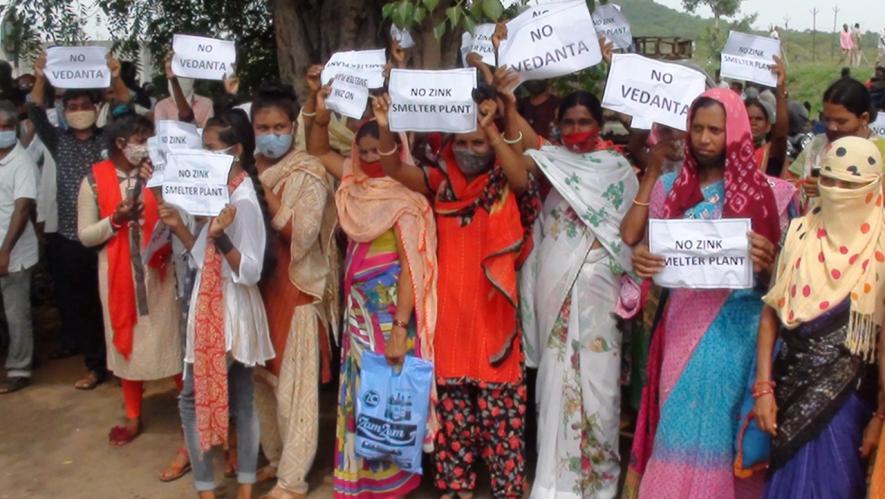
Following the incident, the Gujarat Government's Industrial Extension Bureau (iNdextB) Managing Director, Neelam Rani, said: “It is unfortunate what happened at Doswada in Tapi district. The need of the hour is to create jobs, bring employment and strengthen economic development in the state, especially in the post-pandemic world.”
She said: “We are committed to creating a conducive environment for industry to grow and will extend support to ensure ease of business. As a responsible government body, the welfare of our communities and focus on environment will always remain a top priority and we will ensure that best standards are followed.”
Notably, multiple tribals groups have been opposing the upcoming zinc smelter plant by the Vedanta group in Dosvada village, Tapi district.
Sarpanchs of 45 villages in Tapi district under the banner of Adivasi Ekta and Vikas Andolan had even gone to meet District Collector HK Vadhvaniya on June 30, but came back after waiting for three hours. The group of sarpanchs, along with its president Pragnesh Gamit, wanted to hand over their memorandum to the Resident Additional Collector (RAC).
Earlier, another memorandum was submitted to the Collector on behalf of Ranikhamba gram panchayat, one of many villages expected to be affected due to the smelter plant.
Another organisation, Adivasi Panch, comprising local tribals who have been opposing the plant, said the local community, which primarily depends on agriculture for livelihood, fears that chemicals from the plant will contaminate the fertile land of villages near the project.
“Many tribal youths have been researching about other projects of Vedanta and are apprehensive after knowing about the after effects of their projects at Tuticorin (Tamil Nadu) and Rajasthan. What is adding to their fear is that chemicals like lead, cadmium, arsenic and sulphur dioxide from the factory would pose a great threat to public health of people,” Romel Sutariya, a tribal rights activist, told NewsClick.
“This apart the environment impact report published by GPCB was not only published late but in English that no local could read or understand. The voluminous report was published on June 20 whereas, the environment impact report is supposed to be published at least 45 days prior to the public hearing,” added Sutariya.
Hindustan Zinc Limited, a Vedanta Group company, announced an investment of Rs 5,000-10,000 crore to set up a 300 KTPA (kilo tonnes per annum zinc) smelter plant at Doswada village in Tapi district spread over 415 acres. An MoU was signed between Gujarat government and the company in October 2020. The first phase of the plant is estimated to cost Rs 6,000 crore and expected to be operational by end of 2022.
The land on which the proposed zinc facilities is planned to be set up was acquired 25 years ago by the Gujarat government for establishing an industrial estate. However, the land was left unused since then.
Get the latest reports & analysis with people's perspective on Protests, movements & deep analytical videos, discussions of the current affairs in your Telegram app. Subscribe to NewsClick's Telegram channel & get Real-Time updates on stories, as they get published on our website.
























